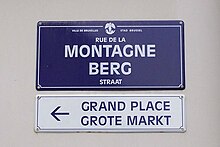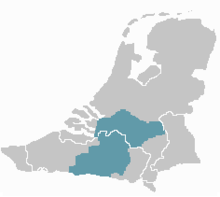Our website is made possible by displaying online advertisements to our visitors.
Please consider supporting us by disabling your ad blocker.
Francization of Brussels


The Francization of Brussels refers to the evolution, over the past two centuries,[1][2] of this historically Dutch-speaking city[1][3][4] into one where French has become the majority language and lingua franca.[5] The main cause of this transition was the rapid, compulsory assimilation of the Flemish population,[6][1][7][8][4] amplified by immigration from France and Wallonia.[1][9]
The rise of French in public life gradually began by the end of the 18th century,[10][11] quickly accelerating as the new capital saw a major increase in population following Belgian independence.[12][13][14][15] Dutch – of which standardization in Belgium was still very weak[16][17][15] — could not compete with French, which was the exclusive language of the judiciary, the administration, the army, education, high culture and the media.[18][19][3][20][2] The value and prestige of the French language was so universally acknowledged[3][21][6][15][22][23] that after 1880,[24][25][16] and more particularly after the turn of the century,[15] proficiency in French among Dutch-speakers increased spectacularly.[13]
Although the majority of the population remained bilingual until the second half of the 20th century,[13][6] the original Brabantian dialect[26] was often no longer passed on from one generation to another,[27] leading to an increase of monolingual French-speakers from 1910 onwards.[21][28] This language shift weakened after the 1960s,[13][29] as the language border was fixed, the status of Dutch as an official language was confirmed,[30] and the economic center of gravity shifted northward to Flanders.[16][24]
However, with the continuing arrival of immigrants (most either from French-speaking countries or more familiar with French) and the post-war emergence of Brussels as a center of international politics, the relative position of Dutch continued to decline.[2][31][32][13][27] Simultaneously, as Brussels' urban area expanded,[33] a further number of Dutch-speaking municipalities in the Brussels Periphery also became predominantly French-speaking.[30][34] This phenomenon of expanding Francization (dubbed the "oil slick" by its opponents),[6][35][13] remains, together with the future of Brussels,[36] one of the most controversial topics in Belgian politics and public discourse.[24][19]
- ^ a b c d Backhaus, Peter (2007). Linguistic Landscapes: A Comparative Study of Urban Multilingualism in Tokyo. Multilingual Matters Ltd. p. 158. ISBN 9781853599460. Retrieved 26 March 2013.
- ^ a b c Janssens, Guy (2005). Het Nederlands vroeger en nu (in Dutch). ACCO. ISBN 9033457822. Retrieved 26 April 2013.
- ^ a b c Jaumain, Serge (2006). Vivre en Ville: Bruxelles et Montréal aux XIXe et XXe siècles (in French) (Études Canadiennes Series nº9 ed.). Peter Lang. p. 375. ISBN 9789052013343. Retrieved 26 April 2013.
- ^ a b Roegiest, Eugeen (2009). Vers les sources des langues romanes. Un itinéraire linguistique à travers la Romania (in French). ACCO. p. 272. ISBN 9789033473807. Retrieved 26 April 2013.
- ^ Janssens, Rudi (2008). Taalgebruik in Brussel en de plaats van het Nederlands — Enkele recente bevindingen (PDF) (in Dutch) (Brussels Studies, nº13 ed.). Retrieved 26 April 2013.
- ^ a b c d Kramer, Johannes (1984). Zweisprachigkeit in den Benelux-ländern. Buske Verlag. ISBN 3871185973. Retrieved 26 April 2013.
- ^ Baetens Beardsmore, Hugo (1986). Bilingualism: Basic Principles (2nd Ed.) (Multiligual Matters Series ed.). Multilingual Matters Ltd. p. 205. ISBN 9780905028637. Retrieved 26 April 2013.
- ^ Ernst, Gerhard (2006). Histoire des langues romanes (in French) (Manuel international sur l'histoire et l'étude linguistique des langues romanes ed.). Walter de Gruyter. p. 1166. ISBN 9783110171501. Retrieved 26 April 2013.
- ^ Vermeersch, Arthur J. (1981). De taalsituatie tijdens het Verenigd Koninkrijk der Nederlanden (1814–1830) (PDF) (in Dutch) (Taal en Sociale Integratie, IV ed.). Vrije Universiteit Brussel (VUB). pp. 389–404. Archived from the original (PDF) on 11 April 2016. Retrieved 26 April 2013.
- ^ Poirier, Johanne (1999). Choix, statut et mission d'une capitale fédérale: Bruxelles au regard du droit comparé (in French) (Het statuut van Brussel / Bruxelles et son statut [61–97] ed.). Brussel: De Boeck & Larcier. p. 817. ISBN 2-8044-0525-7.
- ^ Rousseaux, Xavier (1997). Le pénal dans tous ses états: justice, États et sociétés en Europe (in French) (Volume 74 ed.). Publications des Fac. St Louis. p. 462. ISBN 9782802801153. Retrieved 26 April 2013.
- ^ Wils, Lode (2005). Van Clovis tot Di Rupo: de lange weg van de naties in de Lage Landen (in Dutch) (Reeks Historama (nummer 1) ed.). Garant. p. 297. ISBN 9789044117387. Retrieved 26 April 2013.
- ^ a b c d e f Blampain, Daniel (1997). Le français en Belgique: Une communauté, une langue (in French). De Boeck Université. ISBN 2801111260. Archived from the original on 11 May 2011. Retrieved 26 April 2013.
- ^ De Groof, Roel (2003). De kwestie Groot-Brussel en de politieke metropolisering van de hoofdstad (1830–1940). Een analyse van de besluitvorming en de politiek-institutionele aspecten van de voorstellen tot hereniging, annexatie, fusie, federatie en districtvorming van Brussel en zijn voorsteden (in Dutch) (De Brusselse negentien gemeenten en het Brussels model / Les dix-neuf communes bruxelloises et le modèle bruxellois [3–56] ed.). Brussel, Gent: De Boeck & Larcier. p. 754. ISBN 2-8044-1216-4.[permanent dead link]
- ^ a b c d Gubin, Eliane (1978). La situation des langues à Bruxelles au 19ième siècle à la lumière d'un examen critique des statistiques (PDF) (in French) (Taal en Sociale Integratie, I ed.). Université Libre de Bruxelles (ULB). pp. 33–80. Archived from the original (PDF) on 11 April 2016. Retrieved 26 April 2013.
- ^ a b c Witte, Els (1998). Taal en politiek: De Belgische casus in een historisch perspectief (PDF) (in Dutch) (Balansreeks ed.). Brussel: VUBPress (Vrije Universiteit Brussel). p. 180. ISBN 9789054871774.
- ^ Von Busekist, Astrid (2002). Nationalisme contre bilinguisme: le cas belge (in French) (La Politique de Babel: du monolinguisme d'État au plurilinguisme des peuples [191-226] ed.). Éditions KARTHALA. p. 348. ISBN 9782845862401. Retrieved 26 April 2013.
- ^ Bitsch, Marie-Thérèse (2004). Histoire de la Belgique: De l'Antiquité à nos jours (in French). Éditions Complexe. p. 299. ISBN 9782804800239. Retrieved 26 April 2013.
- ^ a b Tétart, Frank (2009). Nationalismes régionaux: Un défi pour l'Europe (in French). De Boeck Supérieur. p. 112. ISBN 9782804117818. Retrieved 26 April 2013.
- ^ Kok Escalle, Marie-Christine (2001). Changements politiques et statut des langues: histoire et épistémologie 1780-1945 (in French) (Faux Titre (volume 206) ed.). Rodopi. p. 374. ISBN 9789042013759. Retrieved 26 April 2013.
- ^ a b Bogaert-Damin, Anne Marie (1978). Bruxelles: développement de l'ensemble urbain 1846–1961 (in French). Presses universitaires de Namur. p. 337. ISBN 9782870370896. Retrieved 26 April 2013.
- ^ Hasquin, Hervé (1996). Bruxelles, ville frontière. Le point de vue d'un historien francophone (in French) (Europe et ses ville-frontières [205-230] ed.). Bruxelles: Éditions Complexe. p. 329. ISBN 9782870276631. Retrieved 26 April 2013.
- ^ Vrints, Antoon (2011). Het theater van de Straat: Publiek geweld in Antwerpen tijdens de eerste helft van de twintigste Eeuw (in Dutch) (Studies Stadsgeschiedenis Series ed.). Amsterdam: Amsterdam University Press. p. 223. ISBN 978-9089643407. Retrieved 26 April 2013.
- ^ a b c Capron, Catherine (2000). La dualité démographique de la Belgique : mythe ou réalité? (in French) (Régimes démographiques et territoires: les frontières en question [255–278] ed.). INED. ISBN 2950935680. Retrieved 26 April 2013.
- ^ van Velthoven, Harry (1981). Taal- en onderwijspolitiek te Brussel (1878-1914) (PDF) (in Dutch) (Taal en Sociale Integratie, IV ed.). Vrije Universiteit Brussel (VUB). pp. 261–387. Archived from the original (PDF) on 11 April 2016. Retrieved 26 April 2013.
- ^ Witte, Els (1999). Analyse du statut de Bruxelles (1989–1999) (in French) (Het statuut van Brussel / Bruxelles et son statut [19-33] ed.). Brussel: De Boeck & Larcier. p. 817. ISBN 2-8044-0525-7.
- ^ a b Treffers-Daller, Jeanine (1994). Mixing Two Languages: French-Dutch Contact in a Comparative Perspective. Walter de Gruyter. p. 300. ISBN 3110138379. Retrieved 26 April 2013.
- ^ de Metsenaere, Machteld (1990). Thuis in gescheiden werelden — De migratoire en sociale aspecten van verfransing te Brussel in het midden van de 19e eeuw (PDF) (in Dutch) (BTNG-RBHC, XXI, 1990, nº 3–4 [383–412] ed.). Vrije Universiteit Brussel (VUB). Archived from the original (PDF) on 15 October 2018. Retrieved 26 April 2013.
- ^ Mares, Ann (2001). Begin van het einde van de nationale partijen. Onderzoek naar de Vlaamse Beweging(en) en de Vlaamse politieke partijen in Brussel: de Rode Leeuwen (PDF) (in Dutch) (19 keer Brussel; Brusselse Thema's (7) [157–185] ed.). VUBPress (Vrije Universiteit Brussel). ISBN 9054872926. Archived from the original (PDF) on 15 October 2018. Retrieved 26 April 2013.
- ^ a b Depré, Leen (2001). Tien jaar persberichtgeving over de faciliteitenproblematiek in de Brusselse Rand. Een inhoudsanalystisch onderzoek (PDF) (in Dutch) (19 keer Brussel; Brusselse Thema's (7) [281–336] ed.). VUBPress (Vrije Universiteit Brussel). p. 281. ISBN 9054872926. Archived from the original (PDF) on 15 October 2018. Retrieved 26 April 2013.
- ^ Janssens, Rudi (2001). Over Brusselse Vlamingen en het Nederlands in Brussel (PDF) (in Dutch) (19 keer Brussel; Brusselse Thema's (7) [41–84] ed.). VUBPress (Vrije Universiteit Brussel). p. 60. ISBN 9054872926. Archived from the original (PDF) on 15 October 2018. Retrieved 26 April 2013.
- ^ Detant, Anja (1999). Kunnen taalvrijheid en officiële tweetaligheid verzoend worden? De toepassing van de taalwetgeving in het Brussels Hoofdstedelijke Gewest en de 19 gemeenten (in Dutch) (Het statuut van Brussel / Bruxelles et son statut [411–438] ed.). Brussel: De Boeck & Larcier. p. 817. ISBN 2-8044-0525-7.
- ^ Witte, Els (2006). De Geschiedenis van België na 1945 (in Dutch). Antwerpen: Standaard Uitgeverij. p. 576. ISBN 9789002219634.
- ^ Klinkenberg, Jean-Marie (1999). Des langues romanes: Introduction aux études de linguistique romane (in French) (Champs linguistiques ed.). De Boeck Supérieur. p. 316. ISBN 9782801112274. Retrieved 26 April 2013.
- ^ Kesteloot, Chantal (2004). Au nom de la Wallonie et de Bruxelles français: Les origines du FDF (in French) (Histoires contemporaines ed.). Éditions Complexe. p. 375. ISBN 9782870279878. Retrieved 26 April 2013.
- ^ Frognier, André-Paul (1999). Les interactions stratégiques dans la problématique communautaire et la question bruxelloise (in French) (Het statuut van Brussel / Bruxelles et son statut [705-720] ed.). Brussel: De Boeck & Larcier. p. 817. ISBN 2-8044-0525-7.
Previous Page Next Page


